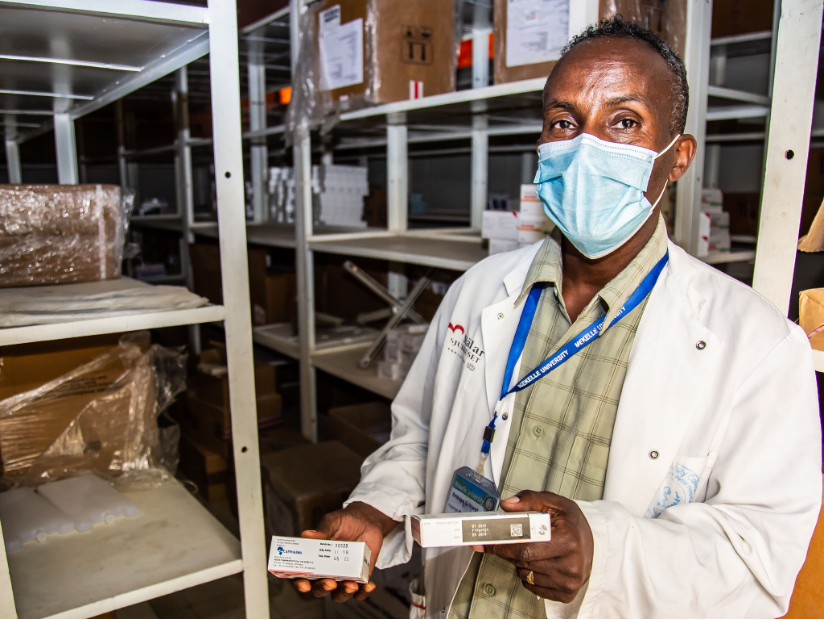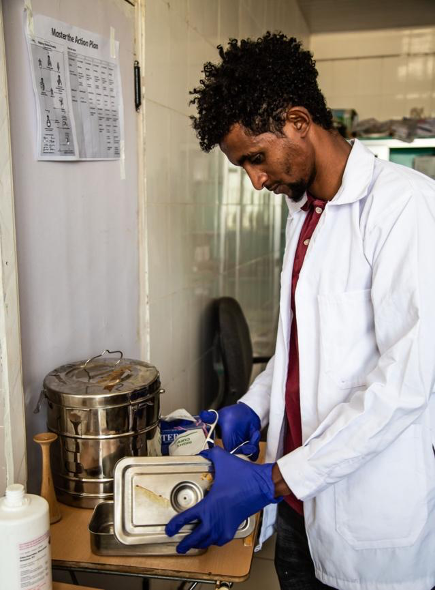SAMRE, Tigray - Tsilal Tsegay was five months pregnant when she heard that two of her neighbours had died during childbirth. At 44 years she was terrified about the impending birth of her own child. During her first trimester, midwives at her local health facility in Finaruwa, Saharti Samre district, Tigray Region, had told her that her pregnancy was high-risk, and that in the event of complications they had neither the medicines nor the equipment to treat her.
As the due date loomed – and at eight months pregnant – Tsilal felt she had no choice but to make a grueling eight-hour trip through mountainous terrain to Samre primary hospital in Samre to access the skilled care she needed during delivery. Some 100 kilometers away, Tsilal had to sell off the last of her livestock to pay for the transport.
“I am a farmer. I lost two sons and most of my cattle during the conflict,” Tsilal recounted from her bed at the maternity waiting home at Samre Primary Hospital, two hours south of Tigray’s capital, Mekelle. “I didn’t have any other means to get here, I had to sell my last big cow.” Tsilal paid almost $US100 to get to Samre, an unimaginable amount for most households in Tigray where 92 percent of the population – 5.2 million people – are struggling to meet even basic needs and are in dire need of humanitarian assistance.
Disruption of essential health services
Sadly, Tsilal’s story is all too common. The conflict in northern Ethiopia has left a once robust health system on the brink of collapse. Extensive damage, destruction, and looting of facilities have severely compromised the delivery of life-saving health services, including emergency obstetric care and protection services. Referral systems for women suffering complications during pregnancy and childbirth are almost entirely absent.
Service delivery is further compromised by a critical shortage of food, fuel, medicines, and equipment. Health professionals who have been working without pay for more than a year – and who are unable to put food on the table for their families – are leaving in droves.
“On top of the lack of medicines, we have lost 15 percent of our health professionals. We had six doctors before and now we only have two,” says Dr. Gebremeskel Kiros, Medical Director at Samre Primary Hospital. “The challenges are psychologically damaging the staff,” he continues. “We see a mother bleeding and we don’t have anything to help her – we don’t have the drugs, the ambulance, or even the cash to send her to another hospital. We feel helpless.”
Ayder Referral Hospital is the largest in the Tigray Region, but in April 2022 it was forced to suspend services due to a lack of medical supplies. “The only medicines left have expired,” says Embaye G/Hiwet, a pharmacist at the hospital. “For every 100 patients, around 15 percent of them get the medicines they need. For the other 80 percent, we have run out of any drugs.”

Childbirth – a life-threatening experience
There are currently more than 117,000 pregnant women in Tigray Region. An estimated 6,000 women will experience some type of complication during pregnancy and childbirth with potentially fatal consequences if medical care is unavailable. Currently, only 17 percent of health facilities in the region (OCHA) are able to provide skilled maternal health care before, during, and after childbirth.
Haftom Atsbaha, one of two midwives deployed by UNFPA, the United Nations sexual and reproductive health agency, and the Ethiopia Midwives Association to support the delivery of maternal health care at Samre Primary Hospital, says the situation is dire. Even though Tsilal is not due to give birth for another month, at 44 years she is high-risk, he says and must stay at the maternity waiting home.
“If she goes back home [to Finaruwa] it’s a death sentence,” Haftom admits grimly. “Even if the medications and equipment are not complete here [at the hospital], she has a better chance of survival.”
Urgent support to build back service delivery

UNFPA is on the ground in Tigray, working with partners to restore the capacities of health facilities to provide comprehensive and quality health services, including emergency obstetric care. In 2022, UNFPA, in partnership with the Ethiopian Midwives Association (EMwA), and with the support of USAID, deployed 44 midwives to 12 critically-affected health facilities in the region. As a result, more than 213,000 women and girls were able to access maternal and reproductive health services. In addition, nearly 20 metric tonnes of lifesaving reproductive health medicines, supplies, and equipment have been delivered to 40 health facilities in parallel with support to strengthen the skills of medical staff. Eleven Women and Girls’ Safe Spaces and 6 One-Stop Centres in Tigray are currently supporting the provision of comprehensive services for survivors of gender-based violence, including the clinical management of rape.
The needs of women and girls are rising across Ethiopia, which is grappling with multiple crises including conflict, the continuing impacts of the COVID-19 pandemic, floods, and one of the worst droughts in 40 years. UNFPA urgently requires more funding to scale up its activities to increase access to sexual and reproductive health care, including maternal health and protection services, and strengthen the health systems in eight regions of the country. To date, UNFPA’s humanitarian appeal of nearly $30 million through to the end of 2022 is only 60 percent funded.
Tsilal waited one month at Samre Hospital to deliver her son. In the event she needed a cesarean section, this would not have been possible at the local health facility near her home. Last year has been traumatic for her and one of loss, she says; but she is grateful that her son is healthy. Sometimes, she allows herself to imagine a better future…and a happy ending: “When all this [impacts of the conflict] is over, I want to come back to live in peace again on my farm and watch my children grow up in front of my eyes.”


